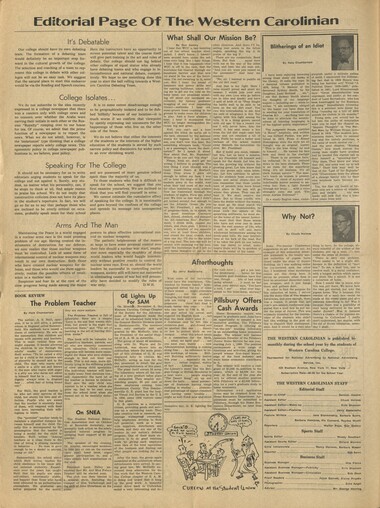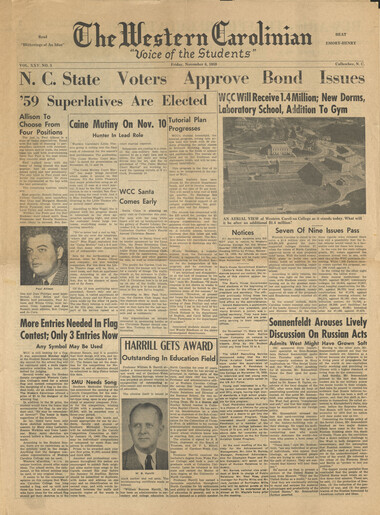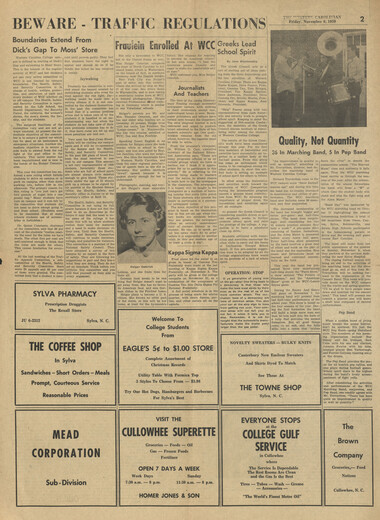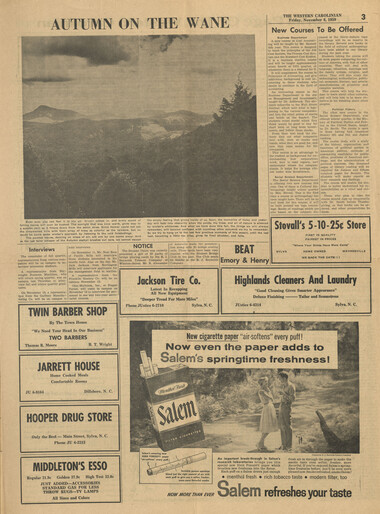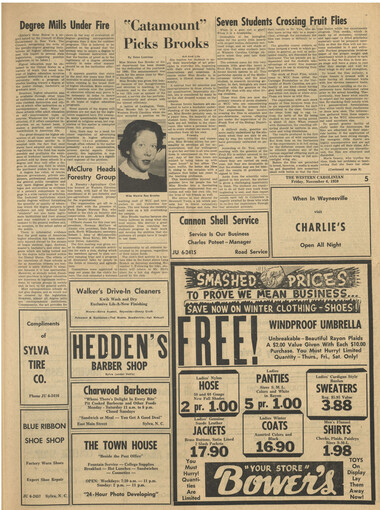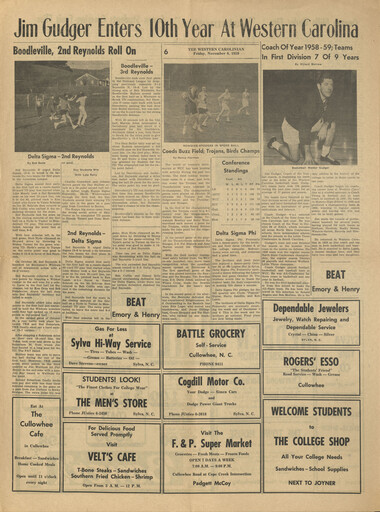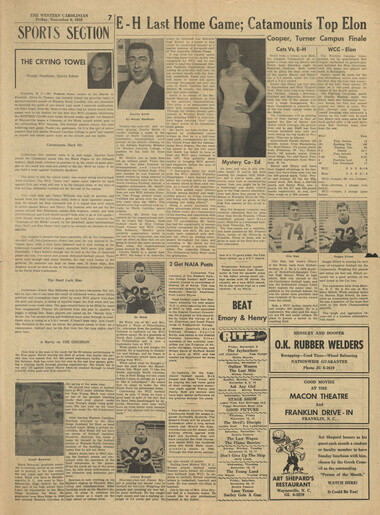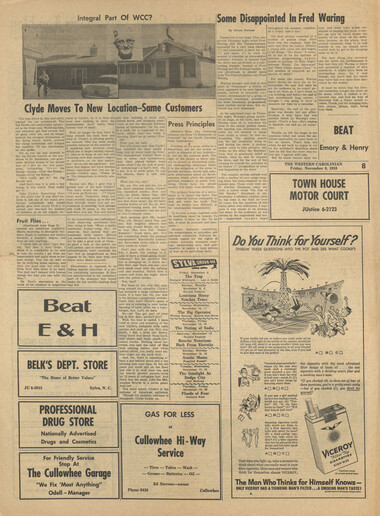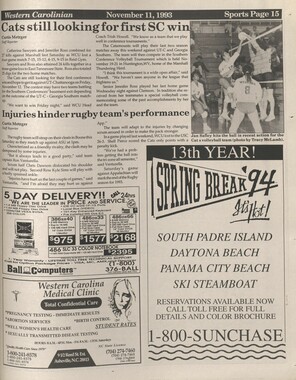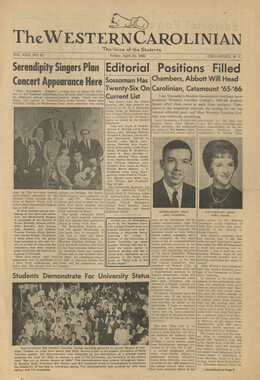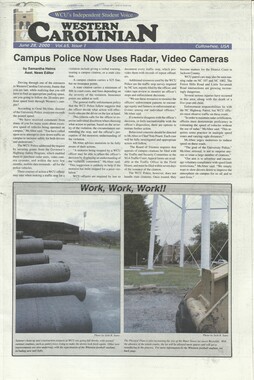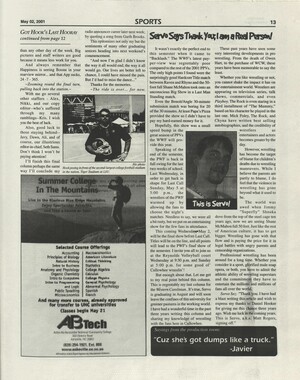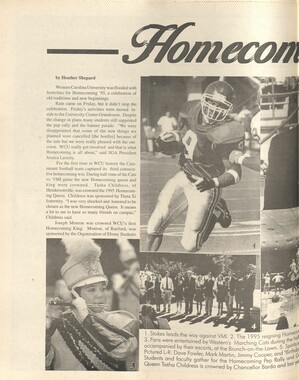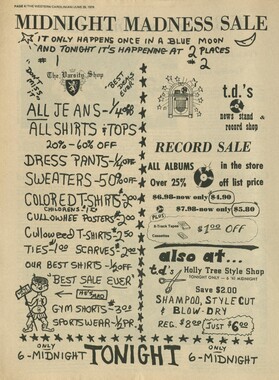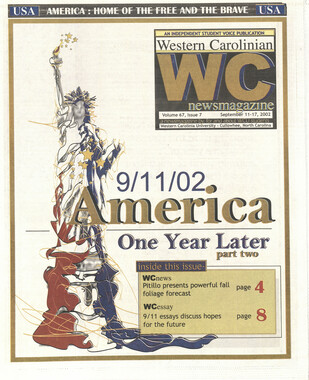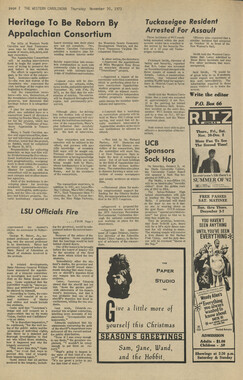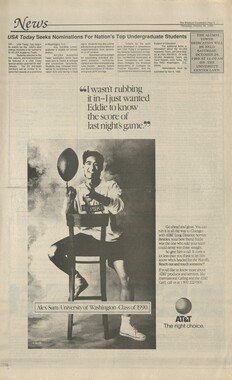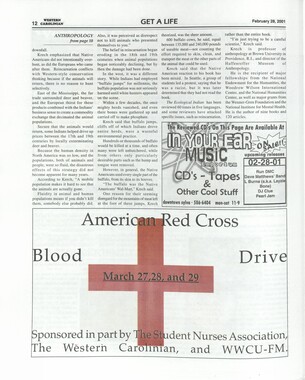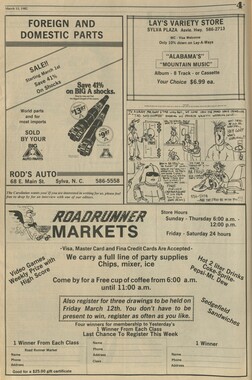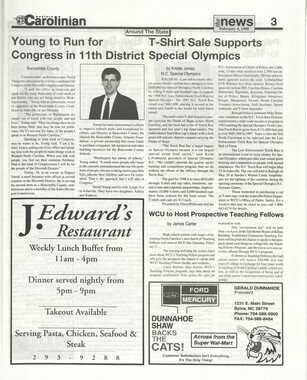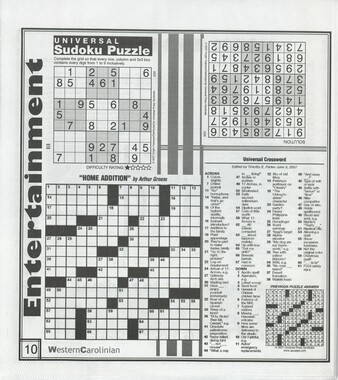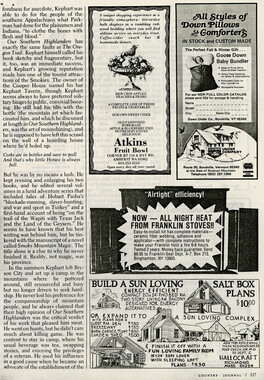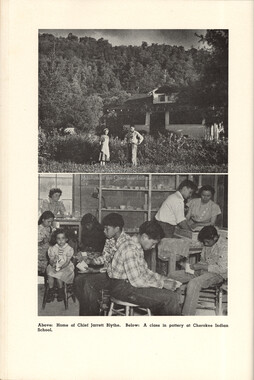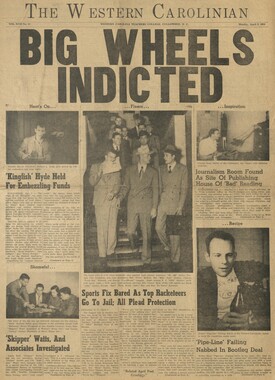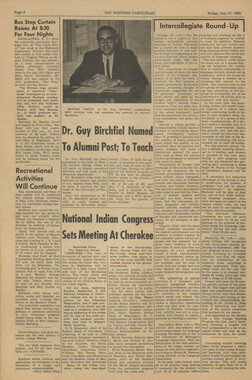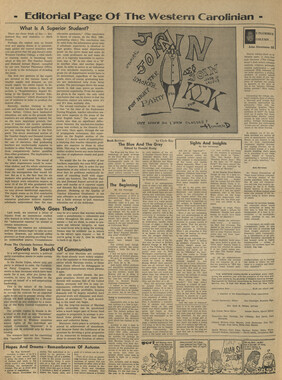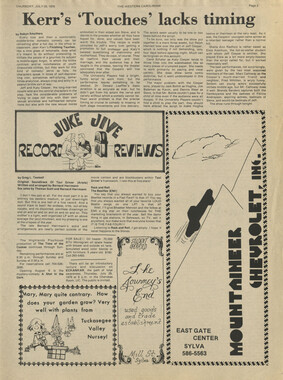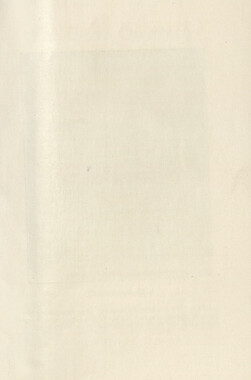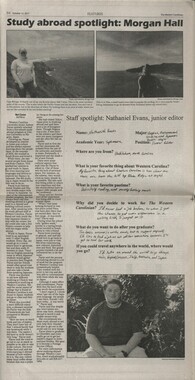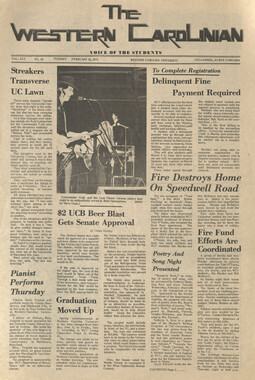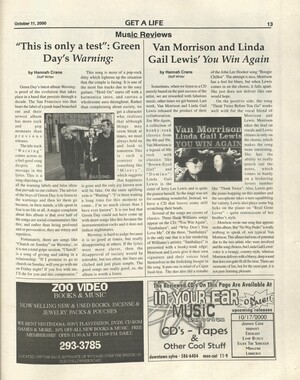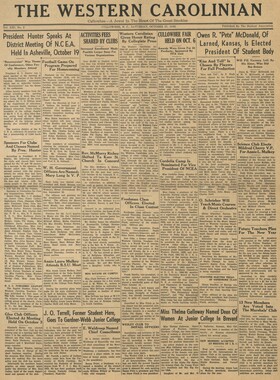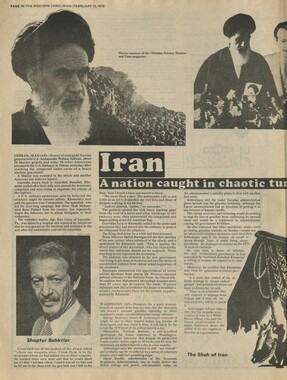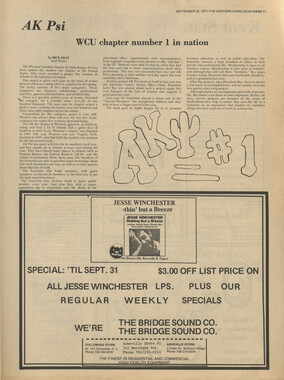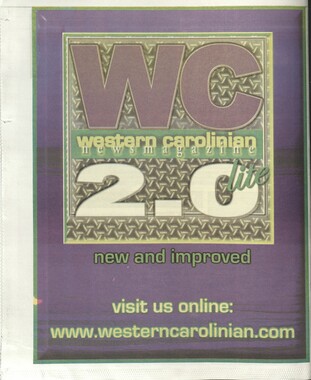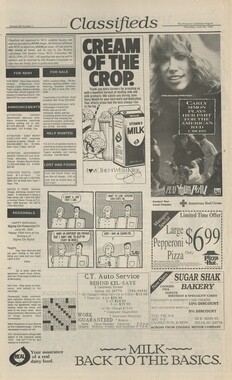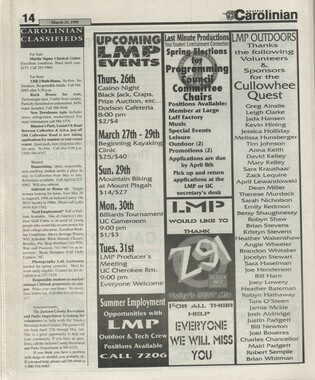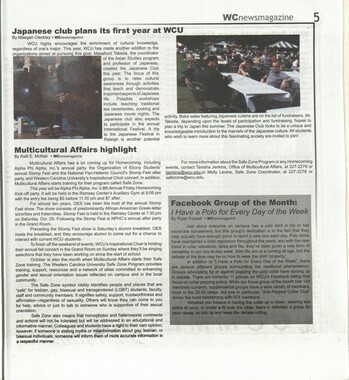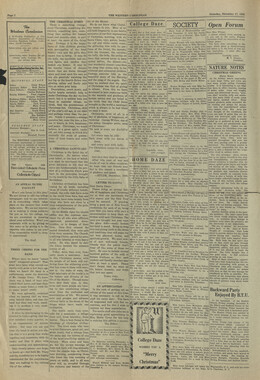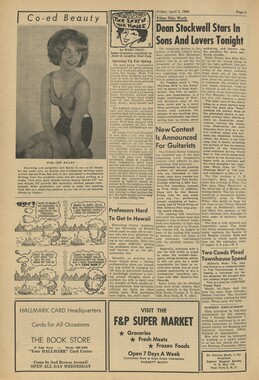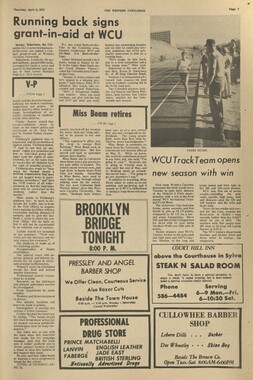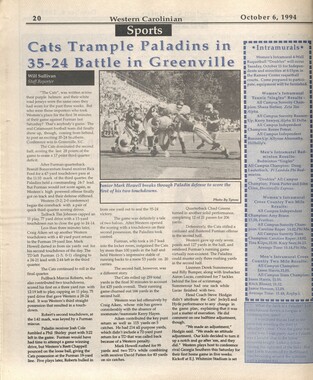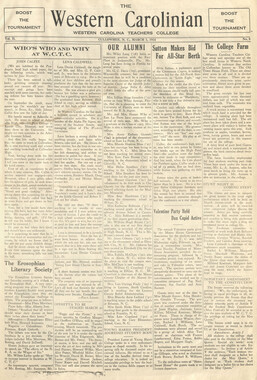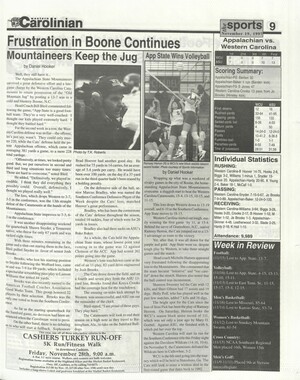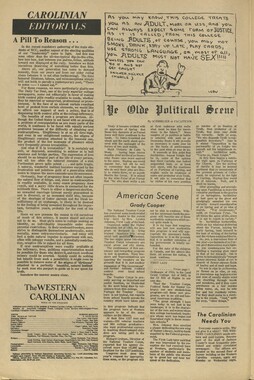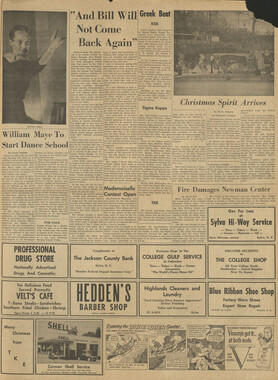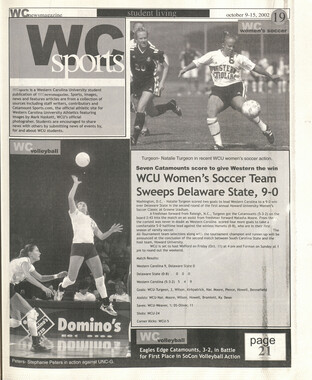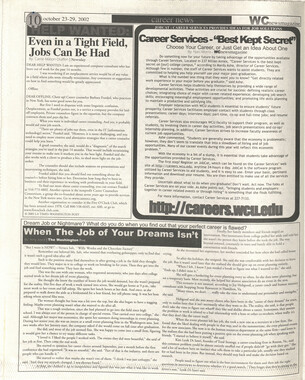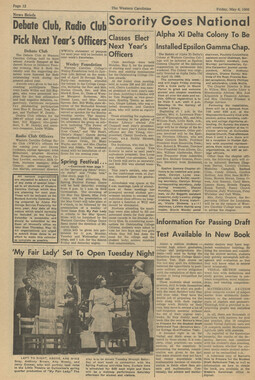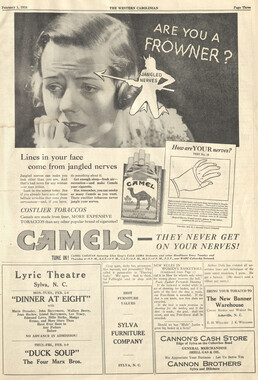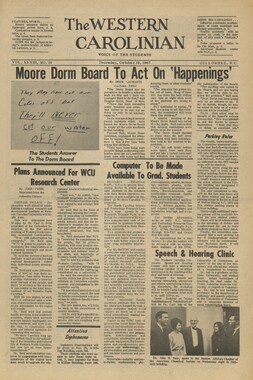Western Carolina University (21)
View all
- Canton Champion Fibre Company (2308)
- Cherokee Traditions (291)
- Civil War in Southern Appalachia (165)
- Craft Revival (1942)
- George Masa Collection (137)
- Great Smoky Mountains - A Park for America (3080)
- Highlights from Western Carolina University (422)
- Horace Kephart (998)
- Journeys Through Jackson (159)
- LGBTQIA+ Archive of Jackson County (89)
- Oral Histories of Western North Carolina (318)
- Picturing Appalachia (6617)
- Stories of Mountain Folk (413)
- Travel Western North Carolina (153)
- Western Carolina University Fine Art Museum Vitreograph Collection (129)
- Western Carolina University Herbarium (92)
- Western Carolina University: Making Memories (738)
- Western Carolina University Publications (2491)
- Western Carolina University Restricted Electronic Theses and Dissertations (146)
- Western North Carolina Regional Maps (71)
- World War II in Southern Appalachia (131)
University of North Carolina Asheville (6)
View all
- Allanstand Cottage Industries (62)
- Appalachian National Park Association (53)
- Bennett, Kelly, 1890-1974 (1463)
- Berry, Walter (76)
- Brasstown Carvers (40)
- Carver, George Washington, 1864?-1943 (26)
- Cathey, Joseph, 1803-1874 (1)
- Champion Fibre Company (233)
- Champion Paper and Fibre Company (297)
- Cherokee Indian Fair Association (16)
- Cherokee Language Program (22)
- Crowe, Amanda (40)
- Edmonston, Thomas Benton, 1842-1907 (7)
- Ensley, A. L. (Abraham Lincoln), 1865-1948 (275)
- Fromer, Irving Rhodes, 1913-1994 (70)
- George Butz (BFS 1907) (46)
- Goodrich, Frances Louisa (120)
- Grant, George Alexander, 1891-1964 (96)
- Heard, Marian Gladys (60)
- Kephart, Calvin, 1883-1969 (15)
- Kephart, Horace, 1862-1931 (313)
- Kephart, Laura, 1862-1954 (91)
- Laney, Gideon Thomas, 1889-1976 (439)
- Masa, George, 1881-1933 (61)
- McElhinney, William Julian, 1896-1953 (44)
- Niggli, Josephina, 1910-1983 (10)
- North Carolina Park Commission (105)
- Osborne, Kezia Stradley (9)
- Owens, Samuel Robert, 1918-1995 (11)
- Penland Weavers and Potters (36)
- Roberts, Vivienne (15)
- Roth, Albert, 1890-1974 (142)
- Schenck, Carl Alwin, 1868-1955 (1)
- Sherrill's Photography Studio (2565)
- Southern Highland Handicraft Guild (127)
- Southern Highlanders, Inc. (71)
- Stalcup, Jesse Bryson (46)
- Stearns, I. K. (213)
- Thompson, James Edward, 1880-1976 (226)
- United States. Indian Arts and Crafts Board (130)
- USFS (683)
- Vance, Zebulon Baird, 1830-1894 (1)
- Weaver, Zebulon, 1872-1948 (58)
- Western Carolina College (230)
- Western Carolina Teachers College (282)
- Western Carolina University (2008)
- Western Carolina University. Mountain Heritage Center (18)
- Whitman, Walt, 1819-1892 (10)
- Wilburn, Hiram Coleman, 1880-1967 (73)
- Williams, Isadora (3)
- Cain, Doreyl Ammons (0)
- Crittenden, Lorraine (0)
- Rhodes, Judy (0)
- Smith, Edward Clark (0)
- Appalachian Region, Southern (3032)
- Asheville (N.C.) (1945)
- Avery County (N.C.) (26)
- Blount County (Tenn.) (195)
- Buncombe County (N.C.) (1680)
- Cherokee County (N.C.) (283)
- Clay County (N.C.) (556)
- Graham County (N.C.) (238)
- Great Smoky Mountains National Park (N.C. and Tenn.) (535)
- Haywood County (N.C.) (3573)
- Henderson County (N.C.) (70)
- Jackson County (N.C.) (4925)
- Knox County (Tenn.) (35)
- Knoxville (Tenn.) (13)
- Lake Santeetlah (N.C.) (10)
- Macon County (N.C.) (421)
- Madison County (N.C.) (216)
- McDowell County (N.C.) (39)
- Mitchell County (N.C.) (135)
- Polk County (N.C.) (35)
- Qualla Boundary (982)
- Rutherford County (N.C.) (78)
- Swain County (N.C.) (2185)
- Transylvania County (N.C.) (270)
- Watauga County (N.C.) (12)
- Waynesville (N.C.) (86)
- Yancey County (N.C.) (72)
- Aerial Photographs (3)
- Aerial Views (60)
- Albums (books) (4)
- Articles (1)
- Artifacts (object Genre) (228)
- Bibliographies (1)
- Biography (general Genre) (2)
- Cards (information Artifacts) (38)
- Clippings (information Artifacts) (193)
- Copybooks (instructional Materials) (3)
- Crafts (art Genres) (622)
- Depictions (visual Works) (21)
- Design Drawings (1)
- Digital Moving Image Formats (2)
- Drawings (visual Works) (185)
- Envelopes (115)
- Exhibitions (events) (1)
- Facsimiles (reproductions) (1)
- Fiction (general Genre) (4)
- Financial Records (12)
- Fliers (printed Matter) (67)
- Glass Plate Negatives (381)
- Guidebooks (2)
- Internegatives (10)
- Interviews (823)
- Land Surveys (102)
- Letters (correspondence) (1070)
- Manuscripts (documents) (618)
- Maps (documents) (177)
- Memorandums (25)
- Minutes (administrative Records) (59)
- Negatives (photographs) (6090)
- Newsletters (1290)
- Newspapers (2)
- Notebooks (8)
- Occupation Currency (1)
- Paintings (visual Works) (1)
- Pen And Ink Drawings (1)
- Periodicals (194)
- Personal Narratives (10)
- Photographs (12977)
- Plans (maps) (1)
- Poetry (6)
- Portraits (4568)
- Postcards (329)
- Programs (documents) (181)
- Publications (documents) (2444)
- Questionnaires (65)
- Relief Prints (26)
- Sayings (literary Genre) (1)
- Scrapbooks (282)
- Sheet Music (2)
- Slides (photographs) (402)
- Songs (musical Compositions) (2)
- Sound Recordings (802)
- Specimens (92)
- Speeches (documents) (18)
- Tintypes (photographs) (8)
- Transcripts (329)
- Text Messages (0)
- A.L. Ensley Collection (275)
- Appalachian Industrial School Records (7)
- Appalachian National Park Association Records (336)
- Axley-Meroney Collection (2)
- Bayard Wootten Photograph Collection (20)
- Bethel Rural Community Organization Collection (7)
- Blumer Collection (5)
- C.W. Slagle Collection (20)
- Canton Area Historical Museum (2110)
- Carlos C. Campbell Collection (462)
- Cataloochee History Project (64)
- Cherokee Studies Collection (4)
- Daisy Dame Photograph Album (5)
- Daniel Boone VI Collection (1)
- Doris Ulmann Photograph Collection (112)
- Elizabeth H. Lasley Collection (1)
- Elizabeth Woolworth Szold Fleharty Collection (4)
- Frank Fry Collection (95)
- George Masa Collection (173)
- Gideon Laney Collection (452)
- Hazel Scarborough Collection (2)
- Hiram C. Wilburn Papers (28)
- Historic Photographs Collection (236)
- Horace Kephart Collection (861)
- Humbard Collection (33)
- Hunter and Weaver Families Collection (1)
- I. D. Blumenthal Collection (4)
- Isadora Williams Collection (4)
- Jesse Bryson Stalcup Collection (47)
- Jim Thompson Collection (224)
- John B. Battle Collection (7)
- John C. Campbell Folk School Records (80)
- John Parris Collection (6)
- Judaculla Rock project (2)
- Kelly Bennett Collection (1482)
- Love Family Papers (11)
- Major Wiley Parris Civil War Letters (3)
- Map Collection (12)
- McFee-Misemer Civil War Letters (34)
- Mountain Heritage Center Collection (4)
- Norburn - Robertson - Thomson Families Collection (44)
- Pauline Hood Collection (7)
- Pre-Guild Collection (2)
- Qualla Arts and Crafts Mutual Collection (12)
- R.A. Romanes Collection (681)
- Rosser H. Taylor Collection (1)
- Samuel Robert Owens Collection (94)
- Sara Madison Collection (144)
- Sherrill Studio Photo Collection (2558)
- Smoky Mountains Hiking Club Collection (616)
- Stories of Mountain Folk - Radio Programs (374)
- The Reporter, Western Carolina University (510)
- Venoy and Elizabeth Reed Collection (16)
- WCU Gender and Sexuality Oral History Project (36)
- WCU Mountain Heritage Center Oral Histories (25)
- WCU Oral History Collection - Mountain People, Mountain Lives (71)
- WCU Students Newspapers Collection (1923)
- Western North Carolina Tomorrow Black Oral History Project (69)
- William Williams Stringfield Collection (2)
- Zebulon Weaver Collection (109)
- African Americans (390)
- Appalachian Trail (35)
- Artisans (521)
- Cherokee art (84)
- Cherokee artists -- North Carolina (10)
- Cherokee language (21)
- Cherokee pottery (101)
- Cherokee women (208)
- Church buildings (190)
- Civilian Conservation Corps (U.S.) (111)
- College student newspapers and periodicals (2012)
- Dams (108)
- Dance (1023)
- Education (222)
- Floods (63)
- Folk music (1015)
- Forced removal, 1813-1903 (2)
- Forest conservation (220)
- Forests and forestry (1198)
- Gender nonconformity (4)
- Great Smoky Mountains National Park (N.C. and Tenn.) (181)
- Hunting (47)
- Landscape photography (25)
- Logging (122)
- Maps (83)
- Mines and mineral resources (9)
- North Carolina -- Maps (18)
- Paper industry (38)
- Postcards (255)
- Pottery (135)
- Railroad trains (72)
- Rural electrification -- North Carolina, Western (3)
- School integration -- Southern States (2)
- Segregation -- North Carolina, Western (5)
- Slavery (5)
- Sports (452)
- Storytelling (243)
- Waterfalls -- Great Smoky Mountains (N.C. and Tenn.) (66)
- Weaving -- Appalachian Region, Southern (280)
- Wood-carving -- Appalachian Region, Southern (328)
- World War, 1939-1945 (174)
Western Carolinian Volume 25 Number 05
Item
Item’s are ‘child’ level descriptions to ‘parent’ objects, (e.g. one page of a whole book).
-
-
Editorial Page Of The Western Carolinian It's Debatable Our college should have its own debating team. The formation of a debating team would definitely be an important step forward in the cultural growth of the college. The selection and coaching of a team to represent this college in debate with other colleges will not be an easy task. We suggest that the natural place to start this endeavor would be via the Reading and Speech courses. Here the instructors have an opportunity to screen potential talent and the course itself will give part training in the art and rules of debate. Our college should not lag behind other colleges of equal status who already have debating teams and who engage in in- terconference and national debate, competitively. We hope to see something done this year to start the ball rolling towards a Western Carolina Debating Team. College Isolates... We do not subscribe to the idea recently expressed in a college newspaper that there was a concern only with college news and no concern over whether the Arabs were carving their initials in each other or the Russian "Royalty" romping over to our house for tea. Of course, we admit that the prime function of a newspaper is to report the news. What we do not admit, however, is the 'isolationist' type thinking that a college newspaper reports solely college news. This egocentric policy in college newspaper publications is, we believe, poor policy. It is to some extent disadvantage enough to be geographically isolated and to be dubbed 'hillbilly' because of our location—it is much worse if we confirm that viewpoint by openly expressing our unconcern for the happenings of those who live on the other side of the fence. We do not believe that either the interests of the students or the interests of the higher education of the students is served by such narrow policy and disconcern for wider news in an ever shrinking world. Speaking For The College It should not be necessary for us to write editorials urging students to speak for the college and not against it. Surely, any student, no matter what his personality, can, if he stops to think at all, find ample reason to praise his school. We do not imply that constructive criticism does not have its place in the student's repertoire. In fact, we will go so far as to say that perhaps those who are inclined to be overly critical on occasions, probably speak more for their school and are possessed of more genuine school spirit than the majority of us. To those students who find it difficult to speak for the school, we suggest that you first examine yourselves. We are inclined to think that you will find yourself in error. We cannot estimate the cumulative effect of speaking for the college. It is inestimable and goes beyond the confines of the college and spreads its message into unsuspected places. Arms And The Man Maintaining the Peace in a world engaged in a nuclear arms race is the most pressing problem of our age. Having created the instruments of destruction for our defense, we now realize that those nuclear weapons must be controlled. Lack of some form of international control of nuclear weapons may result in our own destruction. Both those who have created nuclear weapons for defense, and those who would use them aggressively, realize the possible effects of retaliation in a nuclear war. Suspicion and fear lie at the root of the slow progress being made among the major powers to place effective international control on nuclear weapons. The pathetic helplessness of the masses at large to have some personal control over their fate should a nuclear war start, emphasize more especially the stupidity of those world leaders who would haggle interminably without positive results to control the nuclear arms race. Even so, should the world leaders be successful in controlling nuclear weapons, society still will have not succeeded in eliminating causes of war but will presumably have decided to modify the rules of war only. D.W.H. What Shall Our Mission Be? BOOK REVIEW The Problem Teacher By Hale Chamberlain The author, A. S. Neill, operates, if he is still alive, a private school in England called Summer- field. His methods have raised a storm of controversy. He acts on the assumption that children are equals with parents and teachers. This is more radical than one might suppose. It means allowing the children to see through the adults' masks of omniscience. Neill writes: "To be called a silly ass by a child is the supreme test of sincerity to oneself and to the child. The man who reacts with a smile is a silly ass and knows it; the man who reacts with anger is a silly ass who dares not admit to himself that he is . . . because dignity always tries to disguise fear . . . often fear of being found out." For Neill, the good teacher is he who not only aproves of the child, but shows his love and affection. Pupils who are aware that the teacher is sincerely fond of them, will respond with their own love, increasing their willingness to leam. The "problem"' teacher tends to maintain a .dignified distance between himself and the child. Usually this is accompanied by the presumption that the teacher is being a model for the child to emulate. Neill writes: "Among teachers as a class there is the idea of being a shining example in behavior ... No man is good enough to be a model to anyone, young or old." Summerfield, the school about which Neill writes, teaches the child obedience to his inner self, not external authority. Experience over the years has taught Neill that his pupils are more self-reliant, emotionally stable, and happier than those who have been educated in an authoritarian atmosphere. His graduates are better prepared for the world; they are more mature. The Problem Teacher is full of aphorisms. Here are a couple: "Love is the sun that warms children, but power is the night that terrorizes them," and "The art cf teaching is the art of leaving children alone." This book will be valuable for prospective teachers, parents, and all who are sincerely concerned with education. Child - oriented programs will become more meaningful for those who love children enough to find out their real needs. This is not easy, more difficulty lying in the differing points of view among child specialists. The individual teacher will have to make many final decisions himself. Apparently the hard lot of the teacher is known to children: Neill says the only child who wanted to be a teacher when she grew up, had to be sent away from the school later when she turned out to be mentally defective. On SNEA The Student National Education Association met on October 21 at Reynolds dormitory, and promptly took action on the newly installed tutorial program by pledging their support of $5 per quarter. The speaker of the evening, Dr. Ainsley, encouraged members to vote pro or con on the current (now past) bond issue, urged greater participation in, and a more closely knit organization of, the club. President Leon Talley announced that Mr. and Miss Future Teacher will be elected soon. The club was then treated to a musical show, featuring the trumpet of Don Yarborough and the skill of John Streetman on the piano. GE Lights Up For SAM On Mondav, November 2, the Western Carolina College Chapter of the Society for the Advancement of Management made the first of its scheduled field trips to the General Electric Division plant in Heridersonville. The members were very cordially met and greeted by Mr. McDuffy, who is the President of the senior chapter of S. A. M. in Asheville. The group of about 40 members, along with Dr. Wayte and Dr. Ashbrook, was shown into an auditorium where the main product of this division of G. E. was displayed fully to visitors. Mr. McDuffy, acting as host for the day, presented in detail, the goal and accomplishments of this plant. The plant itself covers 55 acres. The laboratory where all the testing of a new product takes place is unequaled. They employ outstanding people, 95 per cent of these employees coming from Henderson County. This Hendersonville G. E. plant has the largest Visual Aid Section in the U. S. In 1958, some, 1200 visitors came to this plant. G. E. operates as a corporate citizen, providing goods and services on a continuing basis. They take creative risk in research, encourage widespread ownership, help employees develop to their full potential, work as a team with suppliers, distributors and dealers, and they are one of the leaders in our nation's defense program. One of their main objectives is to do good relations work by giving each employee some idea of the total operations of the business and finding out what people are looking for in a job. After the tour, the group again assembled in the auditorium where refreshments were served. In saying good bye, Mr. McDuffy expressed deep admiration for the fine work that the Western Carolina College chapter of S. A. M. is doing and urged that it keep up the good work. A beautiful scenic drive back to Cullowhee ended a very interesting and in- By Don Gentry I hear that WCC is fast bursting out of her school teacher strait jacket. I don't know. I haven't been around here under the oak trees very long. But I hear things. I hear that it has happened—that WCC is off to the race, that the hurricane has blasted through our mountain barrier and that now we stand in the eye of the hurricane. I'm not swearing to it, mind you. But I hear: the sound cf hammers and power drills and the roaring bulldozer, voices telling me to get out the vote on the bond issue; our president sounding off about our increased enrollment; my history professor bragging of our ever expanding library—methinks I hear old, moss-grown trees crashing to the ground to make room for children to play. And a finer whisper, I hear. I hear it murmured that WCC no longer distinguishes between big and great. Well, you can't sail a boat against the wind. So we're off to the race, obsessed by the national mania for bigness. I tell myself, son, you don't row this boat. But something whispers back, "Could I, as a passenger, know the destination?" So I speak it aloud. How about that, Mr. President? Where to do you sail this ship? Please, kind sir, don't get me wrong. I believe in progress. The first thing I ever chewed was a ready made Sears & Roebuck dress. Then when I grew old enough to lather my face, I was off to hear the bugle of the most modern army in the world. And when they had need of my rack for other wandering souls, science flew me homeward through the blackest of nights. Flew me, mind you! We flew so fast that I didn't get turned around fast enough to see the Atlantic Ocean. So you see, Mr. President, I am a child of progress—born, so to speak, on the great American Conveyor Belt, shined, checked, and stamped An All-American Boy'. Furthermore, I drink milk, respect my elders, and chew gum. I intend to marry a member of the opposite sex, sire at least three children, and attend the local church. And then one day I'll die in the midst of a big deal. The heavens will be seared with moaning for my soul, until the knowledge that I left no will turns thoughts of me to the other direction. And there I'll be, selling real estate to the fallen angels, speaking the big A in praise of the big P. These are my credentials. Read them. But then . . . squat here with me in the way of the olden time, and hear the old man ask, "And you sir, were you raised on the pavement?" And hear me answer: "No, sir. I learned to paddle on the old dirt road." And that is my fight. Here I raise myself proud and plant my banner. I would join your arm with my own (you who go before me in time and deeds) and have it said of both of us 'They fought the battle well to be able to be born on the old dirt road'. You owe this comradeship to me. And the oath of allegiance is this. Toy lightly with this light among the hills. It is a thing grown sacred with old age. It has a record you nor I will never have. Into the world, it has sent many a boy from the old dirt road—sent him away and yet retained a bit of each. Forth he went a better man because of this school tucked away beneath the mountains. Go slow, Mr. President! But if build you must, remember this. Let us have a mission. Let my President lift himself and speak for the dumb. Let him detest the growing big without the growing great. Let him know that true size grows only upon intensity. Let him continue to advertise for students from every economic and social strata—but let him remember that those youths born of parents who have found their place in the sun will go where they please. They can afford it. We shall receive our share. But to those youths who have the desire without the means, he must go. He must search the coves and the mountainsides, he must walk the streets of the sprawling milltowns, he must enter the home of the tenant farmer. He must find that those minds who have not even one to show them the real essence of life, who if left to drift will end mere windswept broomstraw among the scrub-pine hills. He may hesitate here at the fork of the road. But if he takes the path no one before him has dared to tread, many hearts there will be to quicken at the mere sound of his name. Blitherings of an Idiot By Hale Chamberlain I have been enjoying browsing among those dusty old books at the library, 10 cents the copy. In a decayed volume published in 1855, being "A Memoir of the Reverend Sydney Smith, by his Daughter, Lady Holland . . . etc.", I see that Sydney Smith shares the thoughts of our language majors — including me — when he writes: "I am extremely obliged by the honor you have done me in sending me your translation of Charles XII ... anything that can be done to alleviate the wretchedness of learning languages, is of the highest public importance." The Judgment House, subtitled "A Novel" helpfully, and written by one Gilbert Parker, was published in 1913. From it Ernest Hemingway stole the style we all thought was so original. Listen: " 'This is the true thing,' he said to himself ... He turned his face here and there in the starlight . . . 'There is no pretense here,' he reflected. 'It is life reduced down to the bare elements. There is no room for the superficial thing. It's all business. It's all stark human nature.'" The master's touch on women is present. Witness: "A cloud of mystery and indefinable horror seemed to envelop her; then a light flooded through her brain . . . with a voice strangely calm she said, 'You mean Adrian Fellowes?' " In a musty English tome, violet- purplish under a delicate patina of mold, I uncovered the distressing fact that in 1829 Russia was being her familiar self! Titled "A Political Diary: 1828-1830," published in 1881, Lord Ellenborough says: "Great dissatisfaction was expressed, and justly, at the conduct of Lord Heytesbury, who has been humbugged by the Russians all along." Immediately following this is a petulant note about the King "running up a bill of 4000 pounds for clothes in six months." Young men, you would not be led into the paths of temptation were you to read the chapter on "Impure Thoughts" in The Perfect Man, by William Heaps, published in 1918. "The modern promiscuous dance, with its sensual hug and the unholy positions, is the cause of much mental sin . . ." And the next chapter, "Kissing Games," how much sorrow the young man might have avoided had he heeded this clarion call to deny himself a "spooning-fest": "Pity them. They know not what they did, and none rose up to tell them." Their fate may well be that of the "Last of the Bighams" with "Illustrations from the album of a strange family who by their own misdeeds have become extinct." Yes, the fine old books of bygone eras are a source of wonder, pity, and delight . . . our own books will look that way a hun- I dred years from now. Why Not? By Chuck Holmes Afterthoughts By Jerry Bastarache Wish some of the instructors would have the inscription, "Untouched by human hands," mimeographed across the top of some of their exams . . . might stimulate thought . . . not the student's thoughts, but their own . . . standards are rising . . so are blood pressures . . . chow hall food is much better this year . . . • but who can taste at 7:30 A. M. . . . one guy salted his cereal and sugared his English book . . . not that the book didn't need it . . . a freshman said he felt like a mountain goat . . . girl-friend said he smelled like one . . . there's no law to protect birds on our campus . . . what this school needs is a committee for the birds, . . . what, we have one? . . . see you next year, buddy . . . new Administration building is coming along fine ... no reference to inside workings, of course . . . Stillwell Building sufficiently heated this year . . . especially on hot days . . . rather tropical, matter of fact . . . Library too . . . but the Library's more like the Belgian Congo or British Honduras in a heat wave . . . people singing "The Desert Song" all up and down the halls . . . usual percentage of freshmen having rough sledding in studies . . . phenomenal percentage of upper-classmen are having same trouble . . . might as well flunk now and avoid formative day, G. E. lighting the way. the rush later . . . get a job testing deodorants . . . better let that mountain goat freshman have that one, though . . . lots of bad colds going around ... it must be bad when your dentist says, "You have a cold, I see" . . . what ever happened to the hula-hoop, anyway? Pillsbury Offers Cash Awards Home Economics majors who expect to graduate next June have an opportunity to assume a key executive position. The Pillsbury Award Program is offering an "on-the-job" training fellowship to an outstanding home economics major. The winner will become Associate Director of the Pillsbury Junior Home Service for one year, starting July 1, 1960. The position encompasses a wide range of functions and activities, giving the award winner first-hand knowledge of the food industry and ways home economics contributes to it. The winner will receive a cash grant of $1,000 in addition to the salary, which is' $4,500 for the year. At the end of the year she will be offered another position with Pillsbury or a $2,500 fellowship for a year's graduate study in home economics. Information and application forms may be obtained from the Home Economics Department. Applications must be submitted to Pillsbury, through the Home Economics Department, no later than December 1. pTivr UnionI Some Pre-session Conference suggestions do get carried out. An example of this somewhat debatable statement is the totally useless collection of pigeon holes found under the steps of Joyner Building. As I was walking under the ivy-covered arch the other day, I wondered what mysterious reason put this thing here. It serves no purpose, other than to hold an occasional discarded candy bar wrapper, and it just hangs there and gathers dust. In order to find the purpose for this collection of holes, I delved into the dusty files of The Western Carolinian, and sure enough, there was a reason. It seems that last year's pre-session conference suggested that a mail box be put under the steps of Joyner. This was evidently intended for the convenience of the students who didn't feel like walking to the post office to dispatch their correspondence. And it would be a very nice thing to have. So the college, always mindful of the wishes of the students, put up a mail (?) box under the steps of Joyner. There is only one problem. There seems to be a slight difference in the definition of "mail box." To me, a mail box, one to receive mail, is a metal container, with a hinged section which opens and shuts like a mouth. It is not a collection of holes. Now I would like to know why this was put there. We know how the idea got started, but why the pigeon holes. Was it because this version of a mail box could be made at the steam plant and give someone something to do? Was it because there was a posibility of mail being delivered to the arch under Joyner? Was it because there's a chance of the pigeons returning to Cullowhee? I really don't understand, but maybe, with the aid of divine revelation, someday I shall. CURfevO M -UeSluJeKt (w«ow THE WESTERN CAROLINIAN is published bimonthly during the school year by the students of Western Carolina College. Represented for National Advertising by National Advertising Service, Inc. 420 Madison Avenue, New York 17, New York Subscription Rate—$2.00 for the School Year THE WESTERN CAROLINIAN STAFF Editorial Staff Editor-in-Chief Derrick Hockin Assistant Editor Chuck Holmes Assistant Editor—Make-up _ Kirk Shannon Assistant Editor—Features Jerry Bastarache Feature Writers Jane Blankenship, Barbara Byers, Barbara Hembree, Pic Connard, Raydee Wyatt Reporters '. Walter Pope, Don Gentry Sports Staff Sports Editor Woody Needham Assistant Sports Editor Dillard Morrow Girls' Intramurals Nancy Harmon, Barbara Messer Reporter Bob Sams Business Staff Business Manager Wes pjerce Assistant Business Manager—Publicity Kirk Shannon Assistant Business Manager—Circulation Bob Dean Proof Readers Joyce Garrett, Elaine Pruette Photographer Zeke Xngt, Advisor Mr. George Herring
Object
Object’s are ‘parent’ level descriptions to ‘children’ items, (e.g. a book with pages).
-
The Western Carolinian is Western Carolina University’s student-run newspaper. The paper was published as the Cullowhee Yodel from 1924 to 1931 before changing its name to The Western Carolinian in 1933.
-
